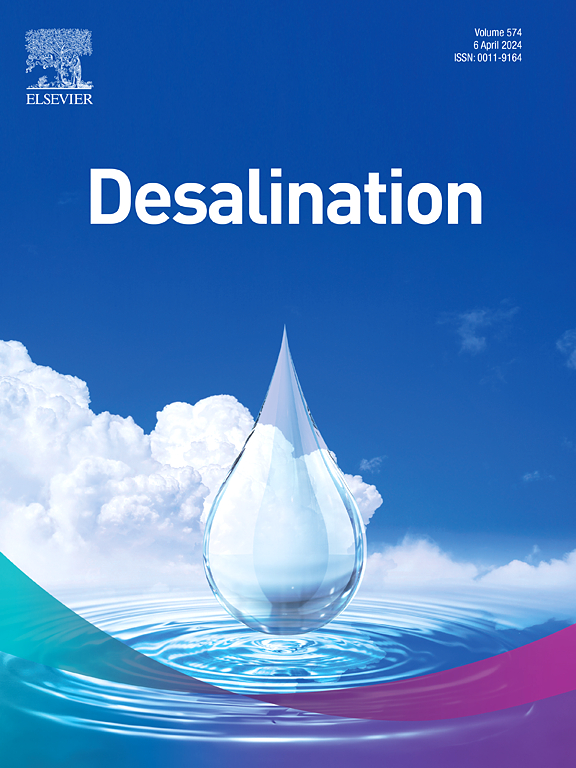Study on the influence characteristics of carboxyethyl chitosan with different degrees of substitution on composite fouling: Experiments, functional group analysis and molecular dynamics simulations
IF 9.8
1区 工程技术
Q1 ENGINEERING, CHEMICAL
引用次数: 0
Abstract
This study investigates the scale inhibition performance of carboxyethyl chitosan (CEC) on composite fouling by employing experimental methods, functional group analysis, and molecular dynamics (MD) simulations to evaluate its effects on CaCO3 and Al2O3 composite fouling. Experimental findings demonstrate that CEC, synthesized through functional group substitution, serves as an effective green scale inhibitor, significantly preventing the formation of composite fouling. Functional group analysis reveals that the carboxyl group on the molecular chain exhibits strong adsorption affinity for Ca2+. MD simulations further confirm significant interactions between Ca2+ and the carboxyl groups of CEC in the solution. CEC's impact on composite clustering includes delaying the adsorption of particles and ions, modifying the aggregation behavior of the cluster, and reducing both the probability and strength of Ca2+ and CO32− adsorbing onto the particle surface. As the degree of substitution of CEC increases, the adsorption probability and intensity of crystallizing ions on the particle surface decrease, leading to enhanced scale inhibition efficiency.
不同取代度羧乙基壳聚糖对复合污垢影响特性的研究:实验、官能团分析和分子动力学模拟
本研究通过实验方法、官能团分析和分子动力学(MD)模拟来研究羧乙基壳聚糖(CEC)对复合污垢的阻垢性能,评价其对CaCO3和Al2O3复合污垢的阻垢效果。实验结果表明,通过官能团取代合成的CEC是一种有效的绿色阻垢剂,可显著防止复合污垢的形成。官能团分析表明,分子链上的羧基对Ca2+具有较强的吸附亲和力。MD模拟进一步证实了溶液中Ca2+和CEC羧基之间的显著相互作用。CEC对复合材料聚类的影响包括延缓颗粒和离子的吸附,改变簇的聚集行为,降低Ca2+和CO32−在颗粒表面吸附的概率和强度。随着CEC取代度的增加,颗粒表面结晶离子的吸附概率和强度降低,阻垢效率提高。
本文章由计算机程序翻译,如有差异,请以英文原文为准。
求助全文
约1分钟内获得全文
求助全文
来源期刊

Desalination
工程技术-工程:化工
CiteScore
14.60
自引率
20.20%
发文量
619
审稿时长
41 days
期刊介绍:
Desalination is a scholarly journal that focuses on the field of desalination materials, processes, and associated technologies. It encompasses a wide range of disciplines and aims to publish exceptional papers in this area.
The journal invites submissions that explicitly revolve around water desalting and its applications to various sources such as seawater, groundwater, and wastewater. It particularly encourages research on diverse desalination methods including thermal, membrane, sorption, and hybrid processes.
By providing a platform for innovative studies, Desalination aims to advance the understanding and development of desalination technologies, promoting sustainable solutions for water scarcity challenges.
 求助内容:
求助内容: 应助结果提醒方式:
应助结果提醒方式:


